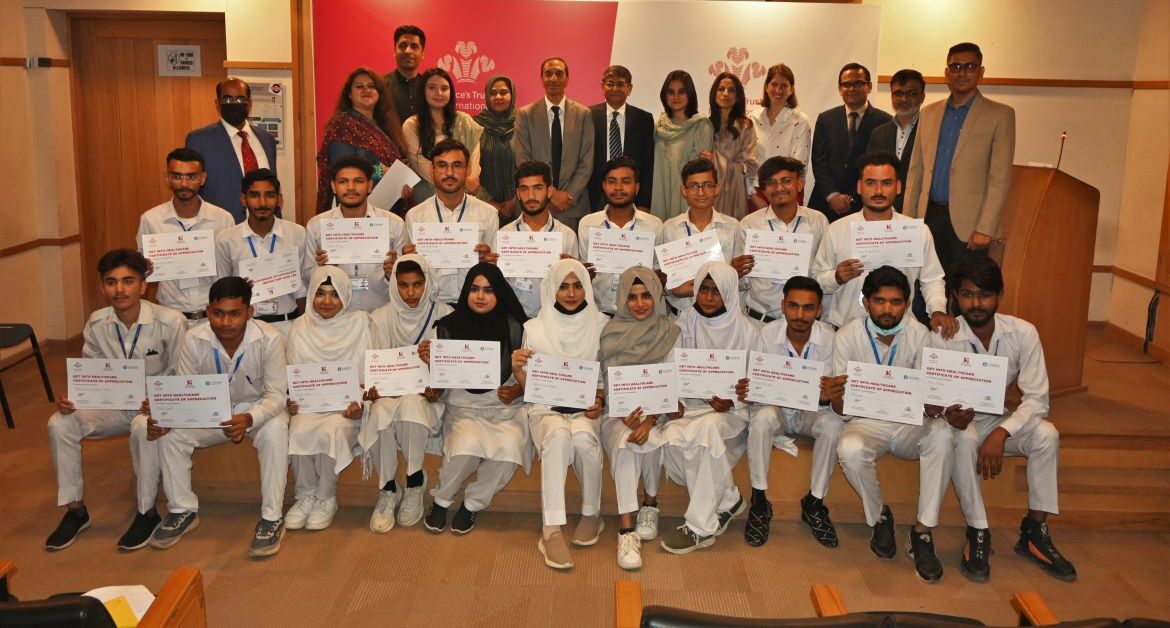IHHN’s Partnership with Chanan Development Association And Prince’s Trust International Helps Young People Develop Careers In Healthcare
As a leader in Pakistan’s healthcare sector, Indus Hospital & Health Network (IHHN) not only strives for excellence and quality in healthcare, but it is also committed to preparing a legacy of exceptional healthcare professionals, who are ready to tackle the challenges of healthcare with empathy, compassion and dignity.
IHHN is thrilled to partner with Chanan Development Association (CDA) – a national youth-led organization – and Prince’s Trust International to deliver their programme. Prince’s Trust International was founded by His Majesty King Charles III, formerly The Prince of Wales, to help tackle the global crisis in youth unemployment. Now present in 18 countries, the organization supports young people in sustainable careers through education, employment, and enterprise programmes.
The Get Into programme combines practical work experience and mentoring with facilitated learning to help young people develop skills for the modern workplace. The programme is carefully designed with employers to empower young people to grow confidence, develop their skills and realise their ambitions, whilst offering the opportunity to gain meaningful employment.
IHHN, CDA & Prince’s Trust International partnered one year ago, for students from the Indus College of Medical Technology & Allied Health (as part of the Indus University of Health Sciences) to build useful skills for employment through Get Into Healthcare. This landmark partnership was celebrated in a ceremony held on Monday, February 20, 2023, at the Indus Hospital, Korangi Campus, Karachi. The ceremony was attended by the first cohort of students who participated in the programme from the Indus College of Medical Technology & Allied Health, along with their families. Between September and December 2022, 24 young people started the programme, with 80% expected to be in positive outcomes after completing the programme.
Speaking at the ceremony, a student expressed “I have learnt so much through the Get Into programme, which I am sure I will carry with me throughout my professional life. I am now really looking forward to entering my work with the new skills I have learnt”.
Key members of Prince’s Trust International were in attendance, including their Chairman, Shabir Randeree, CBE. From CDA, Executive Director, Muhammad Shahzad Khan & Director Program Hira Naz Awan attended. From IHHN, CEO, Dr. Zafar Zaidi, Executive Director, Communication & Resource Development Directorate, Syed Mashhood Rizvi and Principal, Indus College of Medical Technology & Allied Health, Dr. Atiya Rohilla and other senior leaders were in attendance.
Dr. Zafar Zaidi, CEO, IHHN, appreciated Prince’s Trust International’s partnership and expressed “Partnerships such as the one we have with the Prince’s Trust International for the Get Into programme are so important to us and for our students to receive world-class training and global perspectives. I have seen how the skills our students have learned through this programme have had such meaningful impact, and I look forward to continuing this landmark partnership”.
Chairman of Prince’s Trust International, Shabir Randeree CBE, commented “It has been great to meet with so many inspirational young people today and to see the positive impact of Get Into Healthcare. We hope that our partnership with Indus Hospital will continue to inspire many more young people to consider the sector, helping them to secure meaningful and sustainable careers”.
IHHN is delighted to partner with Prince’s Trust International, whose legacy of supporting every young person towards success no matter their background or challenges, continues to be a source of inspiration not only for us but also for countless others. We pray that our partnership with them is only strengthened and that it continues to reinforce our noble mission.




